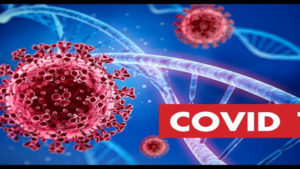 The fourth wave of COVID-19 infections across the Federation of St. Kitts and Nevis has begun to subside. During the February 02, 2022 NEOC press briefing, Chief Medical Officer (CMO) Dr. Hazel Laws stated that long COVID-19 may still be affecting some persons.
The fourth wave of COVID-19 infections across the Federation of St. Kitts and Nevis has begun to subside. During the February 02, 2022 NEOC press briefing, Chief Medical Officer (CMO) Dr. Hazel Laws stated that long COVID-19 may still be affecting some persons.
“There are some persons who have recovered from COVID-19 but go on to describe symptoms, long-standing symptoms or what we deem long COVID-19. These symptoms include malaise, fatigue and brain fog just to name a few. Long COVID-19 has been a challenge as health entities and countries have different practices and requirements for making the diagnosis. In the United Kingdom (UK) you have to be experiencing or complaining of some of these symptoms for at least three (3) weeks before you are diagnosed with long COVID-19, whereas in the United States if these symptoms persist for a month the diagnosis may be made. All persons who have had COVID-19 whether they have been hospitalized or may have only had mild symptoms can experience long COVID-19. So, persons who were COVID-19 positive and experienced only chills, fatigue or mild fever for three or four days and were recovered, you can still go on to experience long COVID-19,” said CMO Dr. Hazel Laws.
The Ministry of Health has embarked on a mass vaccination campaign in order to provide protection to citizens and residents of St. Kitts and Nevis from the deadly COVID-19 virus. According to CMO Dr. Hazel Laws, the complexity of the COVID-19 virus calls for robust action to help curb the spread.
“Long COVID-19 can happen no matter what variant of the virus a person is infected with. Omicron only emerged in November of last year so not enough time has elapsed for scientists to say emphatically what are the signs and symptoms of long COVID-19 secondary to Omicron. Although getting vaccinated significantly lowers the risk of getting long COVID-19, reinfection may cause a flare-up in symptoms. It is too soon according to scientists but mild initial symptoms may not signal reduced risk. If you were diagnosed with COVID-19 due to the Omicron variant and your symptoms were mild, there is still a risk of you being affected with long COVID-19. We cannot take Omicron for granted, we cannot be nonchalant about it, we need to do all we can in terms of prevention and control,” said CMO Dr. Hazel Laws.
Preventing exposure to COVID-19 coupled with double-dose vaccination against COVID-19 remains the most effective way in combatting the deadly virus. Older adults who are unvaccinated and those with underlying chronic conditions which include diabetes and hypertension are most at risk.
